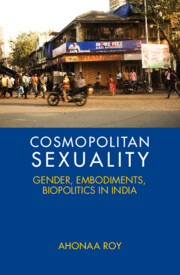Book contents
- Frontmatter
- Dedication
- Contents
- List of Figures
- List of Abbreviations
- Acknowledgements
- 1 Introduction
- 2 Bioengineering, Beauty and Racial Sensibility
- 3 Contesting Violence, Constructing Power
- 4 Festival, Spectacle, Eroticism
- 5 Biopolitics and Biosocial Citizenship
- 6 Performative Participation, Sexual Health and Community Development
- 7 Cosmopolitanism: Rights, Citizenry and the Culture of Representation
- 8 Postscript
- Glossary
- Index
8 - Postscript
Published online by Cambridge University Press: 14 October 2022
- Frontmatter
- Dedication
- Contents
- List of Figures
- List of Abbreviations
- Acknowledgements
- 1 Introduction
- 2 Bioengineering, Beauty and Racial Sensibility
- 3 Contesting Violence, Constructing Power
- 4 Festival, Spectacle, Eroticism
- 5 Biopolitics and Biosocial Citizenship
- 6 Performative Participation, Sexual Health and Community Development
- 7 Cosmopolitanism: Rights, Citizenry and the Culture of Representation
- 8 Postscript
- Glossary
- Index
Summary
In light of the discussion thus far, the book echoes Martin Heidegger's mediation on the essence of modern technology, presenting a reflection on the concept of bio-power and biopolitics. Heidegger's posthumously published Beiträge zur Philosophie (Contributions to Philosophy, 1999), written between 1936 and 1938, suggests a critique of the metaphysics of modernity. Heidegger's discussion on machination, or ‘machenschaft’, refers to ‘making’ (poesis, techne), which further relates to the concept of ‘being’ as ‘makeable’, or more precisely, self-making. Heidegger's modernity is inclined to machenschaft, or in other words, objectification and subjectification of beings, submitting to the illusive attempt at technological nihilism. This quest for understanding human life further allows the establishment of the study of the subculture ‒ involving a new conception of knowledge, practice and ‘truth’. Foregrounding this ordering of life, modern self-empowering subjectivity, or Michel Foucault's regulation of the life of the population that constitutes ‘bio-power’, is immanent within the history of Western political rationality (Sinnerbrink 2005; see also Joronen 2012). However, Giorgio Agamben rejects Foucault's historical analysis of bio-political governmentality, arguing instead that bio-power exercised over ‘bare life’ discloses the ‘inner truth’. But in examining this connection of bio-power and totalitarianism, Agamben seeks to analyse the fundamental political problem of modernity that understands the intimate relationship between ‘sovereign power’ and ‘bare life’. For Agamben, the norm in modern political rationality has exposed the ‘sovereign violence’ to the biological existence and ‘political control’ of one's life (Lechte 2013: 58; Oksala 2010).
So, in this work, rather a critique, I try to uphold the ‘sovereign model of power’ that re-inscribes bio-power within the crucial logic of bio-politics and the development of modern capitalism. In other words, ‘politicization’ manifests a critical account of the neoliberal governmentality of the body's control and bio-political affinities that are grounded in the dynamics of corporeal life. I also seek to delineate the ontological position of one's own desire. Understanding the nexus of desire and the bio-political management of life is the symbiosis between the nihilism of ‘machination’ as appropriated by Heideggerian direction and the realization of living beings in the metaphysics of the subjective consciousness as the site of social subjection. Guattari and Negri (1990: 14‒16), deterritorialize the productive composition of a machine as ‘the machinic liberation of desire’ – a site for revolutionary transformation.
- Type
- Chapter
- Information
- Cosmopolitan SexualityGender, Embodiments, Biopolitics in India, pp. 226 - 237Publisher: Cambridge University PressPrint publication year: 2023



